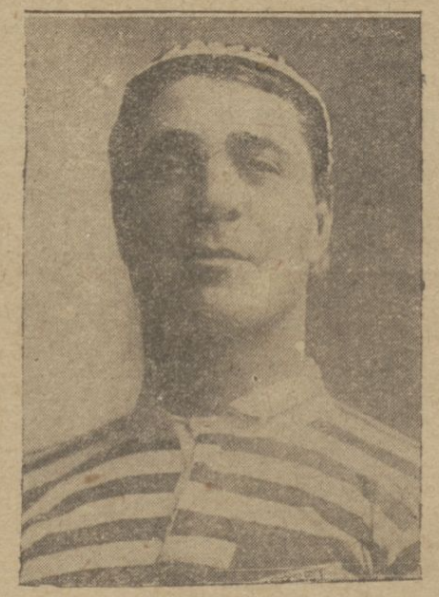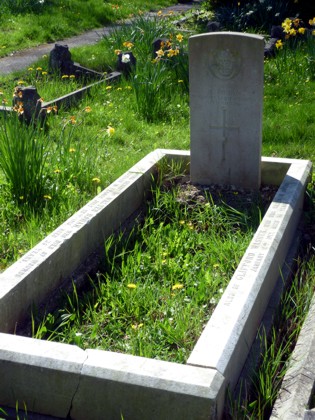Walter L. Roman, Lance-Corporal, 1st Battalion Somerset Light Infantry
Walter Roman, known as ‘Rattler Roman’ for his powerful rugby tackles, was a local celebrity and one of Bridgwater's most high-profile war casualties. Born on 1 July 1880 in West Street to George, a brick and tile maker, and Bessie, he began playing rugby at 13 for the Bridgwater Dreadnaughts. By 1897, he was representing Somerset. In 1899, he joined the army to fight in the Second Boer War and later served in India until 1907. Returning to Somerset, he worked in the brickyards and remained an army reservist.
Roman continued playing rugby and moved north in 1910 to join the professional Rochdale Hornets. Around this time, he married Henrietta Washer. When World War I broke out, he was at sea between Australia and New Zealand. As a reservist, he reported in Sydney and returned to Britain, where he was promptly called to service and made a corporal. He fought in the early battles of the Somersets and, by 10 May 1915, was promoted to sergeant. On 17 May 1915, the Hull Daily Mail reported he had narrowly escaped injury when a spent artillery shell struck his shoulder. However, on 12 July 1915, he was demoted to private for drunkenness, though he later regained rank as a lance corporal. The stresses of the war were clearly taking their toll on him.
Walter was one of five brothers serving in the war. A 26 January 1916 article in the Mercury listed his brothers: Private H. Roman (7th Gloucesters), Lance Corporal W. J. Roman (Walter, 1st Somersets), Corporal George Roman (Coldstream Guards), Sergeant C. Roman (Coldstream Guards), and Driver W. Roman (ASC). A brother-in-law, Amos Martin, served in the Royal Navy.

On 1 December 1915, the Rochdale Observer reported on Walter's brief leave, noting he looked well despite harsh conditions in France. He described the stark contrast between war zones and life in England and remained optimistic about the Allied efforts. He spoke of the severe winter weather and the morale-boosting activities troops engaged in, such as football and entertainments.
Walter's birthday coincided with the first day of the Somme. The following extract from "A Short History of The Somerset Light Infantry (Prince Albert's)", p. 39, outlines what his battalion went through:
The Regiment added greatly to its splendid record in the long and desperate fighting that marked the Battle of the Somme. The 1st Battalion, like all the battalions of the 11th Brigade, sustained terrible losses on July 1st, 1916, in the attack on Serre Grandcourt, Brigadier-General Prowse being killed early in the attack while calling on his troops to remember they belonged to the "Stonewall" Brigade. "If wants shifting, the Somerset Light Infantry will do it," he declared before the attack was launched, and well did the Somerset Light Infantry show that the confident words of their beloved leader were justified, for the battalion had the honour of penetrating to the furthest point reached by the 4th Division in that great assault. Although their flanks were exposed, the men of the Somerset Light Infantry held on to the position they had won till their numbers were reduced to a mere handful, and Colonel Thicknesse, who had commanded the Battalion, had been killed. It was a glorious attempt, in which the battalion sacrificed itself to achieve the impossible.
Charging forward with the Somersets, Walter sustained severe wounds to his thigh, hand, and leg. On 5 July 1916, he was transported to England for treatment but succumbed to his injuries on 28 July. His death was widely mourned. On 2 August 1916, the Western Daily Press reported, "Much regret was felt in the town when it became known that Lance Corporal Walter Roman, of the Somerset Light Infantry, had died of wounds in Cheltenham Hospital."
Walter's funeral in Bridgwater was a solemn occasion. His body was brought home, and a service was held at Holy Trinity parish church. The procession to Wembdon Road Cemetery was imposing, with his coffin draped in the Union Jack and carried by six Somerset sergeants. Soldiers on leave and members of the Bridgwater detachment of the Somerset Volunteer Regiment joined the cortege. The graveside service, led by Rev. de St. Croix, was fully choral and attended by a large crowd. Many floral tributes were laid in his memory, reflecting the deep respect and sympathy felt by the community.
Walter was survived by two children (both with Hetty) - Edna Amelia, born Rochdale 27 March 1912, and Leonard James, born Rochdale 9 Feb 1913. After Walter's death, Hetty returned with their children to Bridgwater and was living with her widowed mother Amelia Washer in 1921. Hetty died in 1935, but by 1939, both her children were married and living close together in Taunton Road, Leonard Roman at 73 and Edna Sendell at 83. Both Edna and Leonard remained in the Bridgwater area.
With thanks to Clare Spicer and Jill Trethewey for additional material, above and below. For Walter's Rugby Career, see here.
Newspaper Clippings
Death Rochdale Observer 29 July 1916

Lance-Corporal Walter Roman of the Somerset Light Infantry, a former captain of the Hornets club, who was seriously injured during the early days of the present advance, died yesterday morning at a hospital at Cheltenham.
After being admitted to the institution for a time his condition seemed to improve. Roman had been shot through both arms and the left leg. On Friday of last week he was able to write a few lines to his wife, who lives at Rochdale. A few days later a nurse at the hospital wrote to Mrs. Roman to the effect that her husband had seemed to be rather easier during the last few days, and that he was “getting on nicely.” Later on Thursday night, however, a telephone message was received at Rochdale asking Mrs. Roman to go to Cheltenham as her husband’s condition was serious. She left Rochdale for that town early yesterday morning, but it is doubtful whether she arrived at the hospital in time to see him alive. About one o’clock yesterday afternoon a telegram was received locally stating that he had died.
Deceased was last at Rochdale in December of last year. During his furlough he played one game for the Hornets, namely against Broughton Rangers. Deceased had then seen much fighting in the Ypres and Armentieres districts, but had escaped uninjured. Lance-Corporal Roman was a native of Bridgewater, playing for his town’s club when fifteen years of age. In the season 1898-9 he gained his county cap, playing his first game against Middlesex at Bath. Later deceased joined the Army, serving for two years in South Africa and five years and a half in India with the Somerset Light Infantry. He arrived at South Africa a few months after the war had broken out and later took part in a great deal of skirmishing. After leaving the Army in the year 1907, he again came into prominence as a Rugby forward, taking part in nineteen county games in all. Roman also played for England against the South and for England against the Rest of England. He, however, failed to secure a place in the English team to meet Wales, and in January 1910 turned professional “signing on” for the Hornets.
Roman soon gained a very enviable reputation in Northern Union football, becoming a very popular player. He was a very fine type of a forward. Possessing marked physical strength and powers of endurance, Roman was always on the ball and a very vigorous player, but he never tried to take an unfair advantage of an opponent. At his best Roman was one of the best forwards in the Union, and it was not a matter of surprise that he was chosen to join the party of representative players that toured Australia and New Zealand just before the outbreak of war.
It is probable that the funeral will take place at Bridgewater.
Western Daily Press 2 August 1916
Much regret was felt in the town when it became known that Lance Corporal Walter Roman, of the Somerset Light Infantry, had died of wounds in Cheltenham Hospital. The deceased was well-known throughout the county as a clever Rugby footballer, and played regularly for the Bridgwater R.F.C. for many years. He played many times for Somerset and was regarded as one of the best forwards in the county. On two occasions he played in International Trial matches. On leaving Bridgwater he joined the Rochdale Hornets playing in the Northern Union International side and accompanying the team to Australia. He was an old Army campaigner, having served through the Boer War, and was called up with the Reserve on the outbreak of the present war. Four brothers are serving in the Army.
The body of the late Lance-Corporal Roman was brought to Bridgwater, and the funeral took place at the Wembdon Road Cemetery, on Tuesday afternoon, amidst every manifestation of respect and sympathy. A service was first held at Holy Trinity parish church, and was conducted by the Rev. E. de St. Croix. The funeral procession to the cemetery was of an imposing character. The coffin was covered with the Union Jack, and was followed by six sergeants in the Somersets, who acted as bearers. The funeral cortege was also joined in by other soldiers home on leave and the Bridgwater detachment of the Somerset Volunteer Regiment. There was a large attendance at the cemetery, the graveside service being also conducted by the Rev E. de St. Croix (vicar of Holy Trinity). Both services were fully choral. There were many beautiful floral tributes’.
Funeral Description Rochdale Times 2 August 1916
The funeral took place yesterday afternoon at Trinity Church, Bridgwater, Somerset, of the late Lance-corporal Waiter L. Roman, of the Somerset Light Infantry, and for six year, a playing member of the Rochdale Hornets' Football Club and captain of the first team for two seasons prior to the out-break of war. The Hornets' officials were re-presented at the interment by Mr. J. Aspinall (director) and Mr. F. T. Hudson (secretary); the Players' Sports Committee, of which the deceased was a member, were, represented by Messrs. John Baxter and Alfred Turner ; and the players of the club were represented by Messrs. George A. Prudence and ex-Sergeant John E. Robinson. A number of floral tributes were sent from Rochdale, including one from the Hornets officials, one from the Sports' Committee, one from the customers at the Beehive Inn, St. Mary's Gate, of which the deceased was the licensee, and one from Mr. and Mrs. Hopkinson.
Lance-Corporal Roman appeared to be making a satisfactory recovery from his severe wounds up to the beginning of last week, but then septic poisoning set in, and from this he succumbed early last Friday morning in the Suffolk Hall hospital, Cheltenham.
Brother's Wounding - Rochdale Times 30 September 1916
The names of Rochdale and district men who have yielded up their lives on behalf of their country in tge arious theatres of war continue to come to hand. Included in the wounded this week is Corporal G. Roman, brother of Walter Roman, who was recently killed. Like his unfortunate brother, George was attached to the Rochdale Hornets Football Club prior to the outbreak of war.

